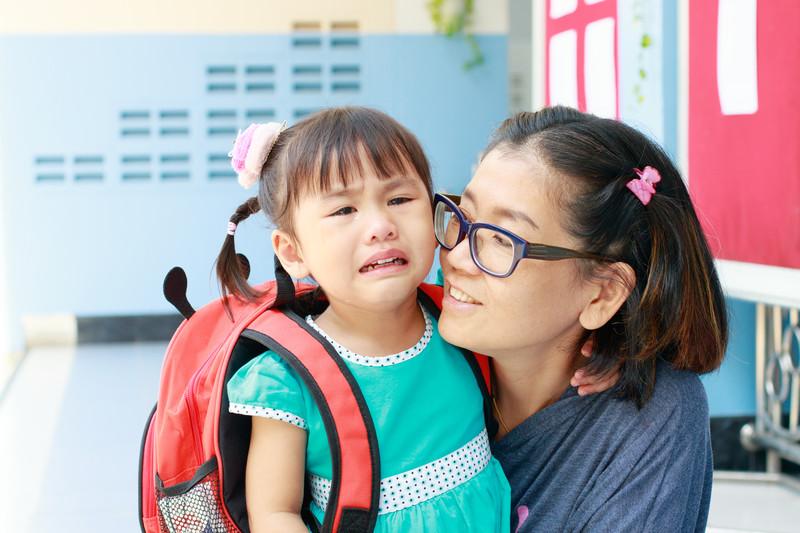|
Written by Jessica Cleary, Psychologist How did your kids go at the beginning of the new school year? If you do kinder or school drop-off you will have noticed some kids take the new challenge in their stride, whereas others have a much harder time with the transition and separation from their mums and dads.
Maybe you found yourself with a little one who was crying and clinging and begging you not to leave. I feel for you if this was the case – it’s so hard! Or maybe your child complained of tummy-aches or headaches before leaving home. This is a common symptom of anxiety. It’s fairly common for some kids to have troubles adjusting to school. Although there is no magic solution when supporting your child through separation anxiety, here are some ideas for you: Find a friend It helps immensely when kids have a friend at school. Ask the teacher who your child seems to play with the most and introduce yourself to the parent at either drop off or pick up. Arrange a play date over at your house or a park to help nurture that relationship. Talk about it ahead of time If you know that tomorrow is likely to be another morning of tears and clingy behaviour then talk about it today when you are both feeling calm and relaxed. When children fear something they need the opportunity to express their feelings. Some of his worries or concerns may seem small or insignificant to us, but for him they are very real and should be respected. It is important to acknowledge that the feeling of worry is very real for your child. Then focus on solutions to the problem. Highlight the fun parts of the day like playing with a friend or lunchtime. Remind him that after a little bit of upset he was able to enjoy the school day and he got to do new and exciting things. Let him know that you will ALWAYS come back. Team up with the teacher Work in partnership with the teacher. Experienced teachers have been through this before so are likely to have a few good ideas. If the separation anxiety doesn’t ease after a few days the teacher may be able to give your child a special job to do immediately upon getting to school. This will serve as a transition activity and is something for him to look forward to. Get to school early so the teacher can personally greet your child and take him to the activity. Don’t focus on the separation On the way to school talk about the first thing your child will do once he gets in the classroom. It shifts the focus from the separation to the enjoyable activity. This helps him mentally prepare before he is physically at school. He starts to visualise the inside of the classroom and can start to get used to the idea of being there. Something like this: “When you go to the reading corner, what book are you going to read first?” or “Which colouring in page will you choose when you get there – the train or the castle?”. Or if you have an arrangement with the teacher (see previous tip) you can talk about this with enthusiasm. Don’t talk about ‘school’ At home in the morning, don’t talk about ‘school’ too much. Talk about ‘reading time’ and ‘drawing’ and 'play time’. Talk about that first activity that he will be doing with the teacher (if you have one planned). The word ‘school’ may currently have a negative, anxiety provoking association for your child so avoid it if possible. Instead talk about the activities he will be doing at school that you know he enjoys. This makes the idea of school more concrete and less abstract. Transitional objects A special note from you kept in his pocket, or matching love hearts drawn on his and your hand can help your child feel connected to you during time apart. Other issues Sometimes separation anxiety occurs in the context of more generalised anxiety or trauma. Maybe there is a real problem at school that is causing distress. Listen carefully to your child and do a little detective work if you sense there is more to the story. Could it be that he doesn’t know how to ask to go to the toilet? Or is he being bullied? Does he find it hard navigating the school grounds at recess? Listen carefully and get more information from the teacher to help you work out what the underlying problem may be. When to seek professional support Often patience and using the above tips can ease separation anxiety. However, there are times when it is necessary to reach out for additional support. You may need further help if:
Finally Remember, your child isn’t trying to manipulate you. The feelings are real for your child and quite distressing. Although you may not always be able to prevent the separation anxiety, you can always empathise with your child and connect with him with cuddles and snuggles at the end of the day. You wouldn’t be the first parent to cry on your way to work after holding it together at school drop-off. This experience is so very stressful for parents. Look after yourself to help manage your own stress. Sleep and eat well and talk to a trusted friend who will listen and support you. Taking care of yourself and allowing yourself your own emotional release will help keep you centred and more emotionally available for your child. Comments are closed.
|
Categories
All
|
Hopscotch & HarmonyAt Hopscotch & Harmony Psychology, you can expect compassionate care and evidence-based guidance on your journey to wellness.
With clinics in Werribee and Belmont, as well as providing online counselling to clients who live throughout Australia, our dedicated team of psychologists and dietitians are committed to providing support to children, teenagers and adults. With a focus on understanding your unique needs, we offer tailored solutions to foster growth and resilience. Trust in our experience and dedication as we work together towards your well-being. Welcome to a place where healing begins and possibilities abound. |
Our services |
Contact usHopscotch & Harmony
Child, Teen and Adult Psychology Our Locations:
WERRIBEE: 1/167-179 Shaws Rd
BELMONT: 92 Roslyn Rd AUSTRALIA-WIDE: Online counselling |
Hopscotch and Harmony respectfully recognise the Aboriginal and Torres Strait Islander people as the first Peoples of the continent now called Australia.
We acknowledge the Bunurong and Wadawurrung people of the Kulin Nation, the traditional owners of the land on which we work, and pay our respects to their Elders, past, present and emerging.
© 2024 Hopscotch and Harmony Pty Ltd



 RSS Feed
RSS Feed
